Hey there, chicken lovers! Are you curious whether your fine-feathered friends can indulge in the sweet and sticky goodness of molasses? Well, you’re in the right place! In this scrumptious blog post, we’ll unravel the mystery surrounding chickens and molasses. From the importance of a balanced diet, to the delicious benefits and potential risks, and even how to whip up a delectable molasses treat for your cluck-adoring buddies, we’ve got all your questions covered. Get ready to embark on a finger-lickin’ good adventure!
Can chickens eat molasses?
Yes, chickens can safely eat molasses in moderation. Molasses is a natural sweetener that, when offered in small amounts, can provide some beneficial nutrients, such as iron and potassium, to your chickens. However, it’s essential to avoid overfeeding molasses, as excessive sugar in their diet can lead to health issues and imbalanced nutrition.
A balanced diet for backyard chickens
Just like humans, chickens need a balanced diet to maintain good health and productivity. A chicken’s diet should primarily consist of a high-quality chicken feed, which should make up around 80-90% of their diet. Chicken feed is specially formulated to meet the nutritional requirements of your backyard flock, ensuring they receive the right balance of proteins, vitamins, and minerals for optimum growth and performance.
The remaining 10-20% of their diet can consist of treats like fruits and vegetables. While treats can add some excitement to your chickens’ daily menu, it’s important not to go overboard. Offering nutritious snacks, like leafy greens, can give your hens a good dose of vitamins and nutrients. However, it’s crucial to remember that moderation is key when it comes to offering treats to your feathered friends to prevent imbalances in their overall nutrition.
Nutritional value of molasses for chickens.
Feeding molasses to chickens in moderation can offer some nutritional benefits. Molasses is rich in essential minerals such as iron, potassium, calcium, and magnesium. These minerals play vital roles in maintaining strong bones, supporting proper blood circulation, and ensuring optimal nerve function in your chickens.
In addition to its mineral content, molasses also supplies trace amounts of B vitamins, like niacin, thiamine, and riboflavin, which are crucial for maintaining good health and efficient energy metabolism within your flock. Offering chickens molasses can also be a source of hydration, as it is typically mixed with water or incorporated into wet feeds to make it easier for the birds to consume.
However, it’s important to note that molasses is high in sugar, which should not make up a large portion of a chicken’s daily caloric intake. While they can enjoy the sweet taste of molasses as an occasional treat, excessive sugar consumption can lead to health issues and disrupt the balance of their diet. So, when feeding molasses to your chickens, it’s best to consider it a supplementary treat that adds variety to their diet and provides a few nutritional benefits alongside their primary high-quality chicken feed.
Nutrition table of molasses for chickens.
| Information | Description |
|---|---|
| Nutritional Value | Rich in minerals such as iron, potassium, calcium, and magnesium; contains trace amounts of B vitamins. |
| Suggested Serving Size | Small, occasional treat mixed with water or wet feeds. |
| Safe Feeding Practices | Offer in moderation to prevent excessive sugar consumption and imbalanced diet. |
| Preparation | Dilute in water or incorporate into wet feeds to make it easier for chickens to consume. |
| Potential Risks | Too much sugar can lead to health issues and disrupt the nutritional balance of a chicken’s diet. |
| Hydration | When mixed with water, it can serve as a source of hydration for your chickens. |
| Digestion | Molasses can be easily digested by chickens when offered in small quantities. |
| Seasonal Availability | Available year-round, as it is a shelf-stable sweetener. |
| Other Benefits | Adds variety to your chickens’ diet and supports their good health with a tasty, natural treat. |
Introducing molasses to your chickens
When introducing molasses to your chickens for the first time, it’s wise to do so gradually. This will allow you to observe how your flock reacts to this new treat and ensure they don’t experience any adverse reactions. Start by offering a small amount and monitor their behavior, appetite, and overall health before increasing the serving size or frequency.
Molasses-infused chicken treat ideas
Wondering how to incorporate molasses into a treat for your chickens? Here are a couple of ideas to get you started:
- Mix a small amount of molasses with water and briefly soak some fresh veggies, such as chopped kale or spinach, before offering them to your chickens. This way, they’ll enjoy both the taste of the molasses and the health benefits of the veggies.
- Create a special molasses-infused treat by mixing it with some cooked brown rice or crushed grains, such as oats or barley. This combination will not only form a tasty snack but also provide your flock with essential nutrients and fiber.
A note on sugar consumption in chickens
While it’s fine for chickens to enjoy occasional treats like molasses, it’s crucial to remember that too much sugar can cause health problems, such as obesity and related complications. Stick to moderate amounts of treats for your chickens and focus on offering a balanced nutritional diet with a high-quality chicken feed at its core.
In conclusion, chickens can safely eat molasses in moderate amounts, enjoying its sweet taste and reaping some nutritional benefits. Remember to follow safe feeding practices, prioritize a balanced diet with high-quality chicken feed, and monitor your flock’s health as you introduce molasses-infused treats. Happy treating!

















